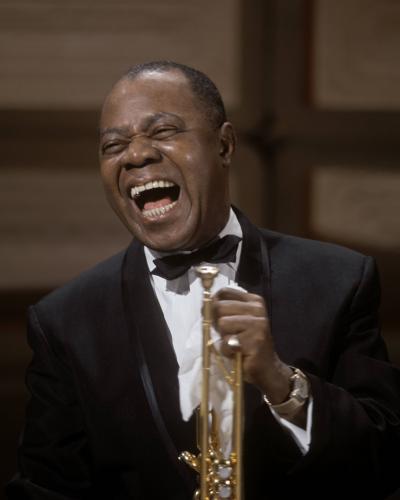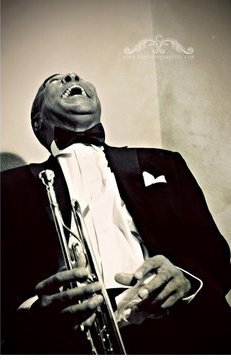I got an e-mail the other day from Dennis Neal, the Florida actor who is creating the double role of Louis Armstrong and Joe Glaser in Satchmo at the Waldorf, my first play, which opens next month in Orlando. “I have been preparing twenty-five years and a lifetime to tell this story,” he said. “You really can’t imagine how profoundly this has affected me.” Dennis is absolutely right. No matter how hard I try, I know I won’t be able to come close to imagining what it will feel like for him to play Armstrong on stage.
 Yes, I wrote both the script of the play and the biography on which Satchmo at the Waldorf is loosely based, and I think that I have a pretty good understanding of what made Louis Armstrong tick. Like everyone who knew him, I find his character to be wholly sympathetic, and I believe that my experience as a working jazz musician has given me a solid grasp of the wellsprings of his artistry. That said, I wouldn’t claim to identify with Armstrong in anything more than a superficial way, if only because our lives were so very diffferent. I come from a middle-class family and was born and raised in a small Missouri town. Armstrong was born in black Storyville, the roughest part of turn-of-the-century New Orleans, and was raised by a part-time prostitute. What’s more, Mayann Armstrong was a single mother, for her son’s natural father deserted him when he was a baby.
Yes, I wrote both the script of the play and the biography on which Satchmo at the Waldorf is loosely based, and I think that I have a pretty good understanding of what made Louis Armstrong tick. Like everyone who knew him, I find his character to be wholly sympathetic, and I believe that my experience as a working jazz musician has given me a solid grasp of the wellsprings of his artistry. That said, I wouldn’t claim to identify with Armstrong in anything more than a superficial way, if only because our lives were so very diffferent. I come from a middle-class family and was born and raised in a small Missouri town. Armstrong was born in black Storyville, the roughest part of turn-of-the-century New Orleans, and was raised by a part-time prostitute. What’s more, Mayann Armstrong was a single mother, for her son’s natural father deserted him when he was a baby.
So while I do think that I understand Armstrong reasonably well, I can’t even begin to know what it would have felt like to be him. Not so Dennis. To be sure, he wasn’t born in black Storyville or raised by a whore, but he’s seen things that I’ve only read about in books, and my guess is that this will give him a kind of access to Armstrong’s interior life that I can only attempt to simulate from the outside in.
 What makes all this so important is that Dennis’ job is to get up in front of an audience and embody Armstrong. I did a certain amount of acting in my youth, and though I wasn’t particularly good at it, I do know what it feels like to play a part. It’s nothing like putting on a mask: you have to meld with the character you’re playing, using elements of your own experience to bring his personality to life.
What makes all this so important is that Dennis’ job is to get up in front of an audience and embody Armstrong. I did a certain amount of acting in my youth, and though I wasn’t particularly good at it, I do know what it feels like to play a part. It’s nothing like putting on a mask: you have to meld with the character you’re playing, using elements of your own experience to bring his personality to life.
Because I’m so closely acquainted with Armstrong’s habits of speech, I was able to write dialogue for for him that sounds natural, and I think I was also able to create a “voice” for Joe Glaser that is equally convincing. (It helped that I was able to listen to an informal radio interview with Glaser that was taped off the air in the Fifties, the only surviving recording of his speaking voice.) I can assure you, however, that none of the dialogue in Satchmo at the Waldorf sounds at all natural when I read it out loud, and I expect you’d be reduced to helpless laughter were I to stand up in front of you and try to act out a scene from the play. But having watched Dennis perform the first forty-five minutes of Satchmo at the Waldorf in a workshop performance earlier this year, I haven’t the slightest doubt that the only time he’ll make the audience laugh is when he’s supposed to do so.
I hasten to point out that Dennis isn’t going to be impersonating Armstrong or Glaser. That’s not what I want. As I explain in the stage directions:
The roles of Louis Armstrong and Joe Glaser are played by the same actor. He need not resemble either man physically and should suggest Armstrong’s voice rather than imitating it.
“I don’t want you to be Rich Little doing Satchmo,” I said to Dennis when we met for the first time back in February. “I want you to be an actor. I want you to create your Armstrong and your Glaser.”
“That’s just what I wanted to hear,” he replied with a smile. And it’s just what I expect to see when I fly down to Orlando next Saturday and sit in on my first rehearsal of Satchmo at the Waldorf.
